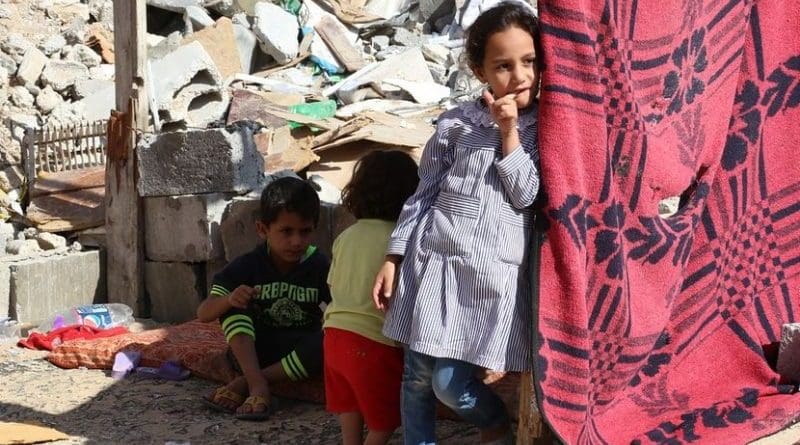Israel: Unlawful Gaza Blockade Deadly For Children, Says HRW
The Israeli government should immediately end its total blockade of the Gaza Strip that is putting Palestinian children and other civilians at grave risk, Human Rights Watch said today. The collective punishment of the population is a war crime. Israeli authorities should allow desperately needed food, medical aid, fuel, electricity, and water into Gaza, and let sick and wounded civilians leave to receive medical treatment elsewhere.
Israel announced on October 18, 2023, that it would allow food, water, and medicine to reach people in southern Gaza from Egypt, but without electricity or fuel to run the local power plant or generators, or clear provision of aid to those in the north, this falls short of meeting the needs of Gaza’s population.
The Israeli bombardment and total blockade have exacerbated the longstanding humanitarian crisis resulting from Israel’s unlawful 16-year closure of Gaza, where more than 80 percent of the population relies on humanitarian aid. Doctors in Gaza report being unable to care for children and other patients because the hospitals are overwhelmed by victims of Israeli airstrikes. On October 17, a munition struck al-Ahli Hospital in Gaza City, causing mass casualties; Hamas blamed Israel for the strike, while Israel said it was a rocket misfire by Palestinian militants. Human Rights Watch is looking into the strike.
Public health officials said the lack of water, contamination of areas by sewage, and many bodies that cannot be safely stored in morgues could trigger an infectious disease outbreak.
“Israel’s bombardment and unlawful total blockade of Gaza mean that countless wounded and sick children, among many other civilians, will die for want of medical care,” said Bill Van Esveld, associate children’s rights director at Human Rights Watch. “US President Joe Biden, who is in Israel today, should press Israeli officials to completely lift the unlawful blockade and ensure the entire civilian population has prompt access to water, food, fuel, and electricity.”
Senior Israeli officials have said the total blockade of the Gaza Strip, where children comprise nearly half of the population of 2.2 million, is part of efforts to defeat Hamas, following its October 7 attack on Israel. Hamas-led Palestinian fighters killed more than 1,300 people, according to Israeli authorities, and took scores of civilians, including women and children, as hostages. On October 9, Israeli Defense Minister Yoav Gallant announced “a complete siege … no electricity, no water, no food, no fuel. We are fighting human animals, and we act accordingly.” The Palestinian Health Ministry has reported, as of October 18, that 3,478 Palestinians have been killed. The Palestinian rights group Defense for Children International – Palestine reported that more than 1,000 children are among those killed.
The laws of war do not prohibit sieges or blockades of enemy forces, but they may not include tactics that prevent civilians’ access to items essential for their survival, such as water, food, and medicine. Parties to the conflict must allow and facilitate the rapid passage of impartial humanitarian aid for all civilians in need. Aid may be inspected but not arbitrarily delayed.
In addition, during military occupations, such as in Gaza, the occupying power has a duty under the Fourth Geneva Convention, to the fullest extent of the means available to it, “of ensuring the food and medical supplies of the population.” Starvation as a method of warfare is prohibited and is a war crime.
Under international human rights law, states must respect the right to water, which includes refraining from limiting access to, or destroying, water services and infrastructure as a punitive measure during armed conflicts as well as respecting the obligations to protect objects indispensable for survival of the civilian population.
Israel’s total blockade against the population in Gaza forms part of the crimes against humanity of apartheid and persecution that Israeli authorities are committing against Palestinians.
News media reported on October 17 that Israel had refused to allow humanitarian aid into Gaza, while Egypt was refusing to allow Palestinians to cross into the Sinai. Egypt and Israel should permit civilians to pass through their respective crossings to seek at least temporary protection or life-saving medical care, while also ensuring that anyone who flees is entitled to voluntary return in safety and dignity.

